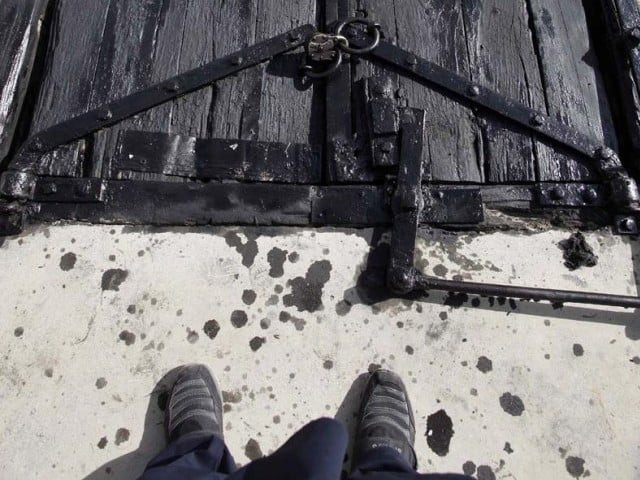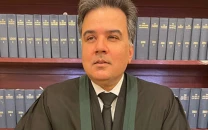In recent years, SC minimised scope of death penalty
Apex court evolves jurisprudence through its various rulings

Pakistan currently has the second largest reported death row population in the world with 4,225 prisoners. However, in the last five years, the country’s apex court has evolved jurisprudence through its various rulings and minimized the scope of death penalty.
In March 2019, former chief justice of Pakistan Asif Saeed Khosa wrote a 31-page verdict, declaring that the rule “falsus in uno, falsus in omnibus – false in one thing, false in everything” shall be an integral part of jurisprudence in criminal cases.
It said the rule shall be given effect to, followed and applied by all the courts in its letter and spirit.
The Latin rule holds that a witness who gives false testimony in one matter is not credible to testify in any matter because “the presumption that the witness will declare the truth ceases as soon as it manifestly appears that he is capable of perjury”. It says faith in a witness's testimony cannot be partial or fractional.
In view of this ruling, a large number of death penalty cases were overturned by the superior courts. The trial courts are also following the same principle in murder cases.
A study conducted by the Justice Project Pakistan revealed that Supreme Court of Pakistan set aside the death penalty in 78 per cent of cases between 2010 and 2018. On an even more uplifting note, 97 per cent of sentences were commuted to life imprisonment or otherwise in 2018.
Last year, Justice Khosa while presiding over a seven-judge larger bench declared that the sentence passed in non-compoundable offences like terrorism must be reduced on the grounds of compromise between the parties in compoundable offence committed in the same case.
“It is declared that in an appropriate case, keeping in mind the peculiar circumstances of the case, compounding of a coordinate compoundable offence may be considered by a court towards reduction of the sentence, within the permissible limits, passed for commission of a non-compoundable offence.”
The 27-page judgment authored by Justice Khosa declared that consideration of this factor vis-à-vis reduction of the sentence passed for commission of the non-compoundable offence lies within the discretion of the court and cannot be treated as automatic or as a matter of course.
The judgment made it clear that there would be no acquittal in non-compoundable offences like terrorism on the basis of compromise between private parties in compoundable offence in the same case. However, it declared that the convict’s sentence could be reduced in a similar situation.
The Pakistan Bar Council (PBC) Executive Committee Chairman Azam Tarar said it was another landmark judgment, which would open up the window to reduce the death sentence in the country.
“Even the court has also given opportunity to the convict approaching the president for a second mercy petition on the basis of compromise in similar matters and the president may reduce the conviction in view of the apex court’s verdicts,” said Tarar.
In the last couple of years, the Supreme Court has also limited the scope of terrorism.
Last year, the apex court urged the parliament to redefine the word ‘terrorism’ by taking into consideration international perspectives and focusing on violent activities aimed at achieving political, ideological or religious aims.
Justice Khosa also authoring the judgment observed that the definition of ‘terrorism’ contained in Section 6 of the Anti-Terrorism Act (ATA), 1997 as is too wide and the same includes so many actions, designs and purposes which have no nexus with the generally recognized concept of terrorism.
The legal experts believe that that ruling has also limited the chances of death sentence.
It is reported that since December 2014, almost 86 per cent people sentenced to death under the ATA were accused of offences that had nothing to do with terrorism. The death penalty was introduced for people involved in trade of narcotics in 1994 through amendment to the Dangerous Drugs Act.
In the case of Ghulam Murtaza, Justice Khosa set out sentencing guidelines in narcotics cases. He also elaborated other mitigating circumstances for juvenile and women. The ruling streamlined the sentence awarded by all courts when trying cases for narcotics and reduced the number of death sentences.
Senior lawyers said application of the death penalty can progressively be restricted through codification of these sentencing guidelines.
In July, the Supreme Court overturned the death sentence of two brothers – Sikandar Hayat and Jamshed Ali – who had sent 27 years of their lives in jail on account of “the right of expectancy of life”.
By a majority of 2-1, a three-judge bench accepted a review petition filed by the death row prisoners.
Authoring the majority judgment, Justice Yahya Afridi held that the petitioners have the right of expectancy of life as they were incarcerated for more than 25 years, while their pleas challenging their death sentences were pending before the competent legal judicial forums.
The judgment noted that the right of expectancy of life is a right of a convict sentenced to death, who while consciously pursuing his judicial remedies provided under the law has remained incarcerated for a period equal or more than that prescribed for life sentence.
The court noted that the right of expectancy of life had genuinely accrued to the petitioners having admittedly being incarcerated in the death cell for a period more than twenty-five years, while they were seeking justice from the appropriate judicial courts of our country.
Legal experts said the life expectancy period will reduce death penalty.
A senior prosecutor, who represents the state in murder cases, said the superior courts now uphold death sentence in only heinous crimes like terrorism. Generally, the courts convert the death sentence into life imprisonment in view of various mitigating factors.
Sharing his own experience, he said in the last three years, the apex court upheld the death sentence in only seven cases in which he was representing the prosecution department.
To a query about the high number of death sentences awarded by the model courts in the recent past, the law officer said the trial courts work in a different atmosphere and the superior courts consider other factors and convert death sentences into life imprisonment.
The Amnesty International’s report on executions and death sentences revealed that Pakistani courts awarded 632 death sentences in 2019, showing an alarming increase of 253 per cent compared to 2018.
The spike is due to the model courts that were established on the recommendations of the National Judicial (Policy Making) Committee to clear the backlog of criminal cases.
Cases in these courts are heard on a regular basis and adjournments are not granted on usual grounds. The district police officials are given the responsibility to make sure the presence of witnesses and complainants whenever needed.
Recently, the Justice Project Pakistan conducted an analysis of 128 death sentences awarded by the model courts. According to the available data, the highest number of death sentences is awarded by the courts functioning in Punjab.
The model courts in Punjab have awarded 75 death sentences which constitutes 58.53 percent of all the death sentences. It is surprising because previously it was noted that Punjab's share in executions, death sentences and death row population was more than 80 percent.
Another trend that shows that the courts in Punjab are more inclined to award death sentences is that on average a model court in Punjab has sentenced two suspects to death during these 33 days, whereas a model court in Khyber Pakhtunkhwa (K-P) sentenced less than one person to death (0.38).
In Sindh and in Balochistan this average is 1.1 and 0.26.
Pakistan among the top 5 executioners
In the wake of a deadly terrorist attack on the Army Public School in Peshawar in December 2014, a tragedy which resulted in the loss of nearly 150 lives, most of them children, Pakistan lifted a six year moratorium on the death penalty in an effort to combat terrorism.
Since then Pakistan has been among the most prolific users of the death penalty with 516 executions and 1,563 death sentences, mostly for non-terrorism related charges. Pakistan currently has the second largest reported death row population in the world with 4,225 prisoners.
“In Pakistan, the capital punishment is an exception and is awarded in very rare cases. No one has been executed in the country in the ongoing year (2020),” Dr Farogh Naseem said on the eve of the “18th World Day Against the Death Penalty” on Friday.



















COMMENTS
Comments are moderated and generally will be posted if they are on-topic and not abusive.
For more information, please see our Comments FAQ